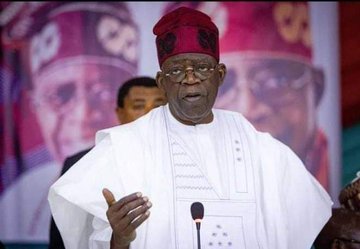Independence: President Tinubu to address Nigerians at 7am Sunday

As part of the activities to mark Nigeria’s 63rd Independence Anniversary, President Bola Ahmed Tinubu will address the nation in a televised broadcast at 7:00 am on Sunday, October 1, 2023.
Special Adviser to the President on Media and Publicity, Ajuri Ngelale, made this known in a statement released on Saturday night.
In the statement titled, ‘October 1st 2023 Independence Day: President Tinubu broadcasts to the nation,’ Ngelale said, “Television, radio stations and other electronic media outlets are enjoined to hook up to the network services of the Nigerian Television Authority and Radio Nigeria for the broadcast.”
Nigeria got her independence on October 1,1960. For several decades now, every first of October is considered a public holiday while being celebrated across the country.
By this, Nigeria had liberated herself from the sovereignty of some British leaders, with late Abubakar Tafawa Balewa as the Prime Minister leading a coalition government of parliamentary system. Three years later, it became a republic.
In October 1963, Nigeria proclaimed itself the Federal Republic of Nigeria and late Nnamdi Azikiwe became the country’s first President.
Tomorrow however, Nigeria will be celebrating the 63rd anniversary of its independence.
According to an earlier publication by the Federal Ministry of Information and National Orientation, FMINO, “October 1, 1960 has remained an emotionally memorable one for Nigerians.”
The ministry had said that “the Critical observers will/as usual, ponder and reflect on the journey so far. Like in previous anniversaries, Nigerians will reflect on issues, concerning the economic, social and political development of the country.”
FMINO wrote, “On this historic day, the British Union Jack was lowered and replaced by the nation’s Green-white-green flag. Many popped champagne with the freedom from the colonial masters.
“And with the independence, a new constitution, establishing a federal system with an elected prime minister and a ceremonial head of state was established. From then, Nigerians took over the reigns of leadership from foreigners.
“Recognising the country’s particular multi-ethnic configuration or diversity, the British government had established for Nigeria a federal structure of government, with three regions. Each of the three regions had its own constitution and a good measure of autonomy while there was a fairly weak Federal Government at the centre.
“The three regions were the Eastern Region, Northern Region and Western Region.
“Since October 1, 1960, the date has remained an emotionally memorable one for Nigerians.
“Critical observers will today, as usual, ponder and reflect on the journey so far. Like in previous anniversaries, Nigerians will reflect on issues, concerning the economic, social and political development of the country.”
Meanwhile, it is traditional for the festivities of Nigeria’s Independence day celebrations which is usually a holiday and celebrated annually by the government of Nigeria, to begin with the President’s address to the people, via electronic broadcast.
Also to mark the celebration, primary and secondary schools perform a ceremonial marchpast in various state capitals and local government areas where they are located. The streets are also filled with celebrations as individuals and groups troupe to the streets wearing green-white-green.
However, offices and markets are closed across the country on independence day.







